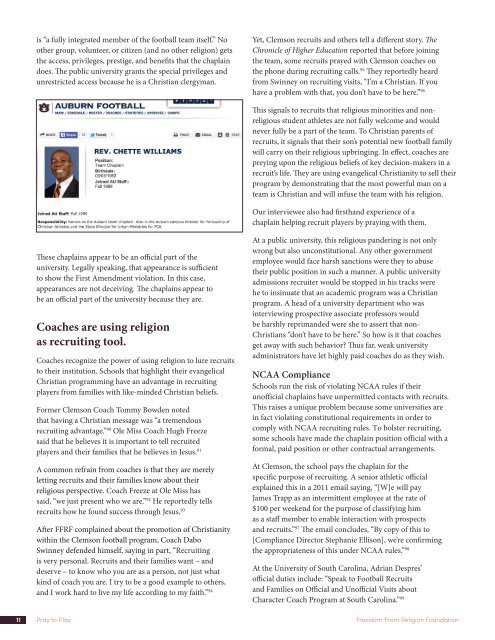Pray Play
PraytoPlayReport
PraytoPlayReport
Create successful ePaper yourself
Turn your PDF publications into a flip-book with our unique Google optimized e-Paper software.
is “a fully integrated member of the football team itself.” No<br />
other group, volunteer, or citizen (and no other religion) gets<br />
the access, privileges, prestige, and benefits that the chaplain<br />
does. The public university grants the special privileges and<br />
unrestricted access because he is a Christian clergyman.<br />
Yet, Clemson recruits and others tell a different story. The<br />
Chronicle of Higher Education reported that before joining<br />
the team, some recruits prayed with Clemson coaches on<br />
the phone during recruiting calls. 95 They reportedly heard<br />
from Swinney on recruiting visits, “I’m a Christian. If you<br />
have a problem with that, you don’t have to be here.” 96<br />
This signals to recruits that religious minorities and nonreligious<br />
student athletes are not fully welcome and would<br />
never fully be a part of the team. To Christian parents of<br />
recruits, it signals that their son’s potential new football family<br />
will carry on their religious upbringing. In effect, coaches are<br />
preying upon the religious beliefs of key decision-makers in a<br />
recruit’s life. They are using evangelical Christianity to sell their<br />
program by demonstrating that the most powerful man on a<br />
team is Christian and will infuse the team with his religion.<br />
Our interviewee also had firsthand experience of a<br />
chaplain helping recruit players by praying with them.<br />
These chaplains appear to be an official part of the<br />
university. Legally speaking, that appearance is sufficient<br />
to show the First Amendment violation. In this case,<br />
appearances are not deceiving. The chaplains appear to<br />
be an official part of the university because they are.<br />
Coaches are using religion<br />
as recruiting tool.<br />
Coaches recognize the power of using religion to lure recruits<br />
to their institution. Schools that highlight their evangelical<br />
Christian programming have an advantage in recruiting<br />
players from families with like-minded Christian beliefs.<br />
Former Clemson Coach Tommy Bowden noted<br />
that having a Christian message was “a tremendous<br />
recruiting advantage.” 90 Ole Miss Coach Hugh Freeze<br />
said that he believes it is important to tell recruited<br />
players and their families that he believes in Jesus. 91<br />
A common refrain from coaches is that they are merely<br />
letting recruits and their families know about their<br />
religious perspective. Coach Freeze at Ole Miss has<br />
said, “we just present who we are.” 92 He reportedly tells<br />
recruits how he found success through Jesus. 93<br />
After FFRF complained about the promotion of Christianity<br />
within the Clemson football program, Coach Dabo<br />
Swinney defended himself, saying in part, “Recruiting<br />
is very personal. Recruits and their families want – and<br />
deserve – to know who you are as a person, not just what<br />
kind of coach you are. I try to be a good example to others,<br />
and I work hard to live my life according to my faith.” 94<br />
At a public university, this religious pandering is not only<br />
wrong but also unconstitutional. Any other government<br />
employee would face harsh sanctions were they to abuse<br />
their public position in such a manner. A public university<br />
admissions recruiter would be stopped in his tracks were<br />
he to insinuate that an academic program was a Christian<br />
program. A head of a university department who was<br />
interviewing prospective associate professors would<br />
be harshly reprimanded were she to assert that non-<br />
Christians “don’t have to be here.” So how is it that coaches<br />
get away with such behavior? Thus far, weak university<br />
administrators have let highly paid coaches do as they wish.<br />
NCAA Compliance<br />
Schools run the risk of violating NCAA rules if their<br />
unofficial chaplains have unpermitted contacts with recruits.<br />
This raises a unique problem because some universities are<br />
in fact violating constitutional requirements in order to<br />
comply with NCAA recruiting rules. To bolster recruiting,<br />
some schools have made the chaplain position official with a<br />
formal, paid position or other contractual arrangements.<br />
At Clemson, the school pays the chaplain for the<br />
specific purpose of recruiting. A senior athletic official<br />
explained this in a 2011 email saying, “[W]e will pay<br />
James Trapp as an intermittent employee at the rate of<br />
$100 per weekend for the purpose of classifying him<br />
as a staff member to enable interaction with prospects<br />
and recruits.” 97 The email concludes, “By copy of this to<br />
[Compliance Director Stephanie Ellison], we’re confirming<br />
the appropriateness of this under NCAA rules.” 98<br />
At the University of South Carolina, Adrian Despres’<br />
official duties include: “Speak to Football Recruits<br />
and Families on Official and Unofficial Visits about<br />
Character Coach Program at South Carolina.” 99<br />
11 <strong>Pray</strong> to <strong>Play</strong> Freedom From Religion Foundation


